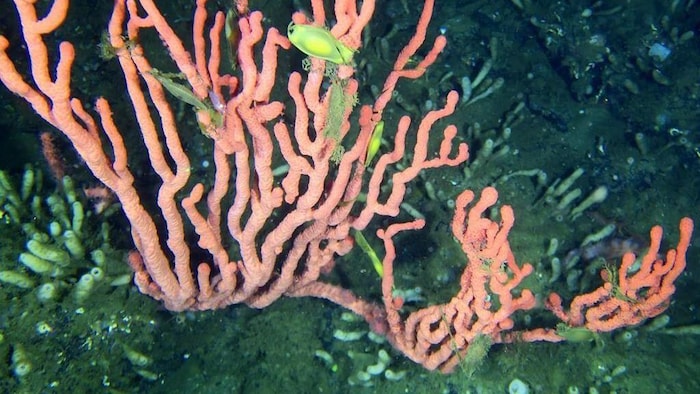Open full screen The coral reef was discovered in the Finlayson Channel area, about 500 km northwest of Vancouver. The Canadian Press With the help of First Nations, scientists have discovered a living coral reef about 500 km northwest of Vancouver, British Columbia. This habitat is the only one known in Canada. The discovery was made possible thanks to a First Nation. This in fact pointed out the presence of a hump at the bottom of the sea where the fish liked to hang out. Deep-sea ecologist Cherisse Du Preez worked with the Kitasoo Xai'xais and Heiltsuk indigenous communities and began searching for the Lophelia coral reef in 2021. She lowered a remote-controlled submersible to the bottom x27;ocean, in the Finlayson Channel. During what was to be the last dive of the expedition, the team discovered a beautiful and thriving ecosystem at around 200m depth. You turn on [the spotlight] and you realize you're the first person to see it all: beautiful pinks and purples and yellows, crevices, mounds. And once you see beyond the corals, you realize there are other animals there, says Cherisse Du Preez, head of the deep water ecology program at Fisheries and Oceans Canada. Loading ELSE ON INFO : The end of the Roulez vert program comes “much too soon”, according to dealersLoading in progress ELSEWHERE ON INFO: The end of the Roulez vert program comes “much too soon”, according to dealers Then you start to see the eels and octopuses or rock fish coming in and out [of the coral reef]. And even when you point the camera upwards, you can see the schools of fish at the top. Everywhere you look, there is life. A quote from Cherisse Du Preez, head of the deep water ecology program at Fisheries and Oceans Canada All the scientific and logical data in the world say there shouldn't be a coral reef there, but the First Nations knew there was something there, explains the scientist. The Ministry of Fisheries announced last week that it had closed the area of British Columbia's central coast above the coral reef to all commercial and recreational bottom-contact fishing, including pelagic trawl. The Ministry said the indefinite closure was based on an important scientific discovery, with this area, although small, being a unique reef in the world which is very susceptible to damage, particularly by fishing gear. This is the northernmost known coral reef in the entire Pacific Ocean, specifies the Ministry. Cherisse Du Preez clearly remembers the enthusiasm of her team when they first discovered the reef. It's quite remarkable to visit these places to get visuals and feel this paradox: it's far away, it's another world, but it's our world, she relates . Mike Reid, director of fisheries for the Heiltsuk Nation's integrated resource management department, said the nation always knew that something thing was supporting fish in the area, but wasn't sure exactly what. The Lophelia Reef is very important for the ecosystem, for the biodiversity of this specific area, it contributes to the overall health of this area, explains Mike Reid. The reef provides habitat and refuge for marine wildlife, allowing the creation of colonies of fish and other creatures, as Cherisse Du Preez explains. This coral reef has valleys and mounds. Mounds provide breeding grounds. Thus, there are all the schools of small fish which live there and hide from their predators. There are also large fish, notably endangered species, which use this coral reef to find food. They take shelter and live there, explains Cherisse Du Preez. She adds, however, that she has found dead corals around the reef, which could be due to climate change. This is a very big concern. One of the reasons it is so important to stop fishing in this area is that we need to remove all the stress possible to give this reef the opportunity to survive the changes that we cannot control. Cherisse Du Preez says a 1 degree temperature change could be devastating for the reef. Leri Davies, spokesperson for the region of the Pacific at Fisheries and Oceans Canada, ensures that fisheries officers from the Conservation and Protection Branch regularly patrol marine refuges, protected areas and closed areas so that regulations are respected. We use various intelligence-driven enforcement methods, including air, ocean, river and land surveillance, as well as night and covert patrols, to actively monitor fishing activities in all sectors and guarantee compliance with the laws, specifies the Ministry. Cherisse Du Preez explains that the Pacific coast of Canada is unique in world, offering nature and wildlife found nowhere else.
The end of the Roulez vert program is coming “much too soon”, according to the dealers
The end of the Roulez vert program comes “much too soon”, according to the dealers
Canada's only known living coral reef has been discovered off the coast of B.C.

